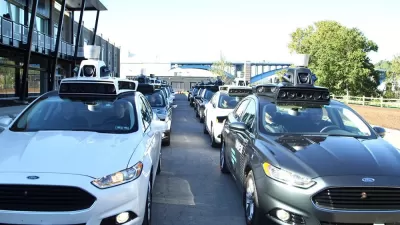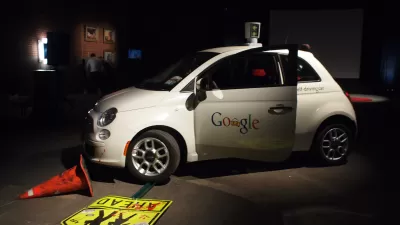So far, only a small minority of major cities have considered self-driving cars in their long-range transportation plans. The question is, should policymakers embrace them or stand in their way?

Citing a report from the National League of Cities, Kim-Mai Cutler contends that many American cities are ignoring self-drivers in their long-range planning. "What's even more surprising is that only 3 percent of these cities' transit plans are even taking into account the impact of ride-hailing companies like Uber and Lyft even though they already operate in 60 of the 68 largest markets in the U.S."
Prospects for autonomous vehicles are intimately tied to land use policy. "The concern is that if suburban governments shirk at designing better, more compact physical space, the additional efficiencies and comforts of self-driving cars will just induce longer mega-commutes and more sprawl, which is bad for the environment."
Much of this hinges on whether self-driving cars (if they catch on) will be privately owned or shared via a transit-like utility. "It's concerning because no one actually knows how much efficiency self-driving cars can really provide. It could be a repeat of the 1940s when streetcar lines in U.S. cities like Los Angeles were dismantled to make way for cars and buses."
FULL STORY: How Many American Cities Are Preparing For The Arrival of Self-Driving Cars? Not Many.

Planetizen Federal Action Tracker
A weekly monitor of how Trump’s orders and actions are impacting planners and planning in America.

Congressman Proposes Bill to Rename DC Metro “Trump Train”
The Make Autorail Great Again Act would withhold federal funding to the system until the Washington Metropolitan Area Transit Authority (WMATA), rebrands as the Washington Metropolitan Authority for Greater Access (WMAGA).

The Simple Legislative Tool Transforming Vacant Downtowns
In California, Michigan and Georgia, an easy win is bringing dollars — and delight — back to city centers.

The States Losing Rural Delivery Rooms at an Alarming Pace
In some states, as few as 9% of rural hospitals still deliver babies. As a result, rising pre-term births, no adequate pre-term care and harrowing close calls are a growing reality.

The Small South Asian Republic Going all in on EVs
Thanks to one simple policy change less than five years ago, 65% of new cars in this Himalayan country are now electric.

DC Backpedals on Bike Lane Protection, Swaps Barriers for Paint
Citing aesthetic concerns, the city is removing the concrete barriers and flexposts that once separated Arizona Avenue cyclists from motor vehicles.
Urban Design for Planners 1: Software Tools
This six-course series explores essential urban design concepts using open source software and equips planners with the tools they need to participate fully in the urban design process.
Planning for Universal Design
Learn the tools for implementing Universal Design in planning regulations.
Smith Gee Studio
City of Charlotte
City of Camden Redevelopment Agency
City of Astoria
Transportation Research & Education Center (TREC) at Portland State University
US High Speed Rail Association
City of Camden Redevelopment Agency
Municipality of Princeton (NJ)





























